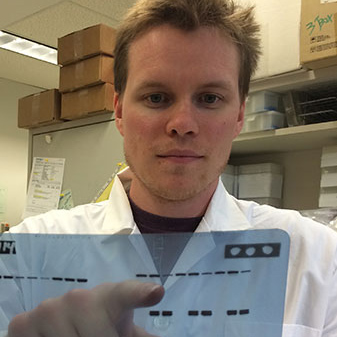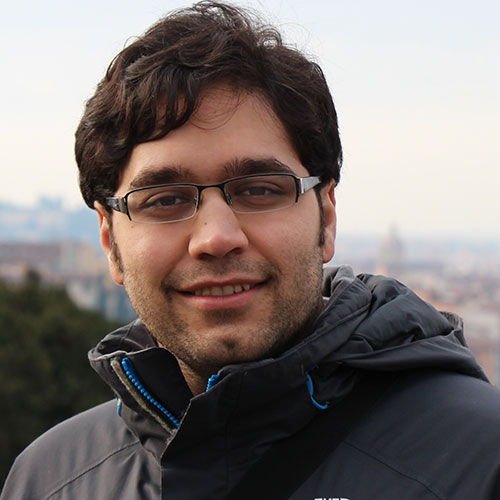Doctoral students at the University of Alberta's Faculty of Medicine & Dentistry continue to show why UAlberta has one of North America's top medical schools. Four students have been named Vanier Scholars, an honour designed to attract and retain world-class doctoral students at Canadian universities.
As part of the recognition, the students, Adam Kinnaird, Hali Morrison, Emily Herman and Amirali Toossi, have been granted scholarships worth $50,000 per year, for up to three years. To be chosen, Vanier Scholars must demonstrate exceptional leadership skills and a high standard of scholarly achievement in their chosen field.
Adam Kinnaird
Adam Kinnaird has spent his entire student life at the University of Alberta, first completing an honours physiology bachelor of science degree before then moving on to medical school. After graduating from medical school, Kinnaird then entered the urology residency training program at UAlberta. His efforts now see him working to complete a PhD in experimental medicine, focusing on advancing basic science and translational research in the field of urology. Kinnaird's current focus is how to target the abnormal metabolism of cancer cells as a therapeutic strategy for treating kidney cancer.
"This scholarship will allow me to concentrate on my research and clinical duties without worrying about an income," says Kinnaird. "My plan is to use this scholarship and dedicated research time as a catalyst to start my career as a clinician scientist at our institution."
Hali Morrison
Hali Morrison began her academic career at the University of Calgary, participating with the U of C's Dinos track-and-field team and receiving a bachelor of science degree in honours astrophysics. A research project in medical physics at the Tom Baker Cancer Centre in Calgary led to a decision to further her education in the field in graduate studies. After beginning a master's degree at the University of Alberta, Morrison recently transferred into the PhD program. Her current research involves improving the accuracy of radiation therapy in the treatment of eye tumours. With her work, she hopes to one day see better health outcomes for patients, such as higher cure rates and fewer long-term complications.
"This award gives me the freedom to pursue my research full time with no financial burdens and will allow me to continue to be involved in athletics," says Morrison. "It will be instrumental in helping me succeed in my PhD, as well as in my future career in medical physics."
Emily Herman
Emily Herman's academic career began at the University of Alberta, receiving a bachelor of science degree in 2011 with first class honours in the Honours Immunology and Infection Program. She then began her PhD program that same year in the Department of Cell Biology. Herman's current research sees her studying a single-celled pathogenic organism called Naegleria fowleri, more commonly known as the "brain-eating amoeba". The water-borne organism, found in Australia, Europe and the southern United States, is found in warm, fresh water around the world and kills 95 per cent of the people it infects. Herman's research goal is to understand what makes Naegleria fowleri deadly, and to identify potential genetic targets for early detection of infection. She also hopes to identify treatment methods for regions with limited resources for health care.
"The Vanier Canada Graduate Scholarships were created as part of a program to attract and retain 'the best minds' to innovate within Canada. I am really honoured to be considered part of that group," says Herman. "One thing that sets the Vanier scholarship apart from others is that it aims to recognize students with both a high level of scholarly achievement and research potential, along with excellent leadership and communication skills. While being recognized for my hard work is satisfying, I am most delighted that the Vanier scholarship will give me the means to further develop these qualities."
Amirali Toossi
Amirali Toossi's path to the Vanier Canada Graduate Scholarship began with a bachelor of science degree in electrical engineering at the KNT University of Technology in Tehran, Iran. Toossi continued his education at the University of Alberta, completing his master's of science degree in electrical and computer engineering before moving into the PhD program where he is studying neuroscience with a research focus of neural interfaces. The goal of Toossi's research is to one day restore the ability of people with spinal cord injury to stand and walk. He is currently working on a technique, which can produce leg movements by delivering electrical pulses to the spinal cord.
"Looking back at Vanier's previous recipients inspires me about what is possible," says Toossi. "This greatly motivates me to achieve my research goals. It also provides me with the opportunities to participate in more conferences and workshops related to my research field and expand my knowledge."



